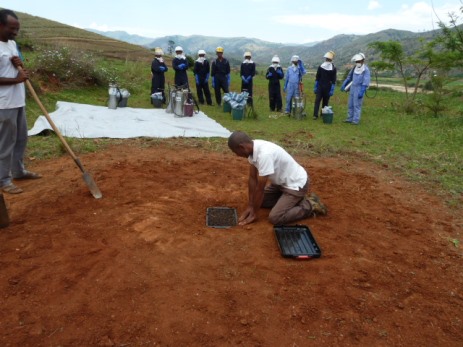AIRS pilots mobile solution to reach remote areas, improving environmental safety.

An environmental compliance officer shows spray operators how to build a mobile soak pit before beginning to spray. Source: Peter Chandonait
In hard to reach areas, AIRS spray teams often camp out for days at a time, as it is difficult or impossible for them to return to a central operational site for the end-of-the-day cleanup.
To increase efficiency and improve environmental safety, AIRS piloted the use of mobile soak pits during the 2013-2014 IRS campaign in remote areas of Madagascar’s Central Highlands and seven districts in the south, where difficult roads require spray operators to access villages via foot. The mobile soak pits enabled spray operators to clean up immediately after completion of daily spraying, rather than having to travel to a central location. The mobile pits also improve control over potentially hazardous wastes because the wastes remain in the mobile soak pit, rather than in the ground.
A 20-quart container with layers of stone, activated carbon, and sawdust, the mobile soak pit can be installed almost anywhere a spray team completes their daily operations. Since the mobile soak pit weighs about 15 kilos, it can be carried to a spray location, installed at a wash site in minutes, and used to catch and treat insecticide waste. After cleanup is complete, the mobile soak pit and tarp for the wash area are removed, and the hole for the soak pit is refilled. The mobile soak pit is then dug up and carried away for use at the next location, while the site is restored to its original condition. As a result, spray operations leave as close to a zero environmental footprint as possible in spray areas.
The mobile soak pits also provide operational flexibility and reduce construction and labor costs over building permanent soak pits. For the 2013-2014 IRS campaign, AIRS Madagascar used 36 mobile soak pits to reach remote areas, compared to the 500 permanent soak pits built for the 2012-2013 IRS campaign. The mobile soak pits were so successful that they have been credited with helping to improve environmental compliance at the sites in which they were used. For the 2014-15 spray campaign, AIRS will extend the use of the mobile soak pits to Mali, Senegal, and Ethiopia.
This story was taken from www.africairs.net
